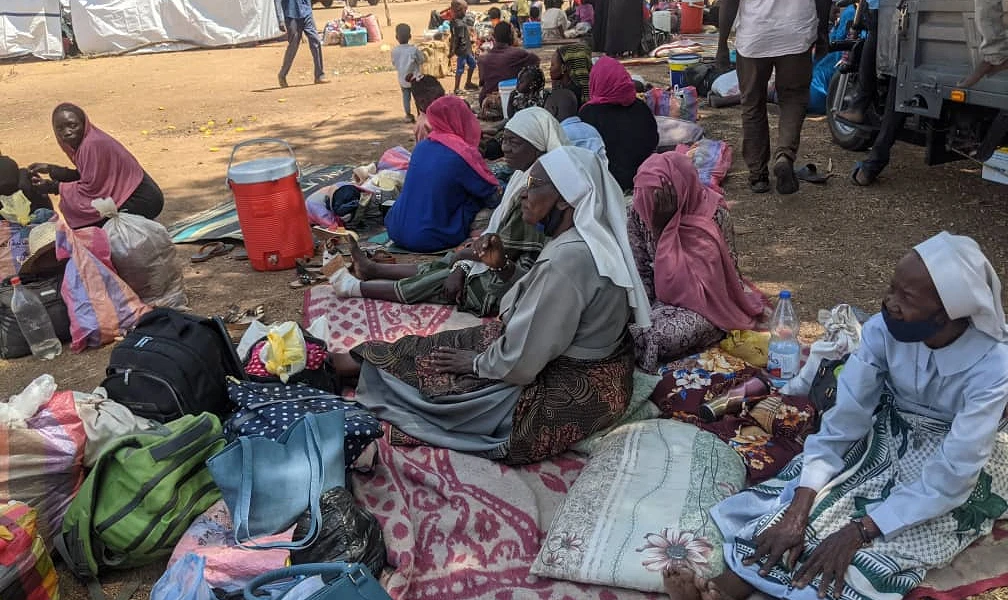
Nuba Mountains: Tens of thousands of displaced are in dire need of help
Tens of thousands of people who have arrived back in the Nuba Mountains region after being displaced by the conflict in Sudan urgently require food, medical assistance and shelter. CSI is responding to the need through its partner organization, the New Sudan Council of Churches (NSCC).

The conflict that began in Sudan in April has driven millions of people from their homes. Tens of thousands of them have headed to the Nuba Mountains region in the southern part of the country, either because they have roots there or because they are on their way to South Sudan. The region is struggling to cope with the massive influx of people. At the same time, there are reports of attacks in the Nuba Mountains itself.
When CSI’s project manager Franco Majok visited the region in February, he reported that the local population was already in urgent need of food, clean water, medical help and support for farming. CSI had already begun providing food assistance in the region through its partner organization. Now, with the new conflict, the needs have multiplied.
Dire conditions
The journey from Sudanese government-controlled areas to the rebel-held Nuba Mountains is difficult and often takes days. If they are lucky, returnees may get a lift by NGO vehicles heading to a refugee camp over the border in South Sudan.
Once they arrive, the returnees face dire conditions, according to the NSCC, which is active on the border between the Nuba Mountains region and South Sudan. Many of those who have fled do not have relatives nearby who can take them in.
The large numbers of internally displaced persons (IDPs), with additional arrivals every day, has put a huge strain on infrastructure and food supply. People are at risk of starvation, and waterborne diseases are spreading rapidly, according to CSI’s partner organization.
“They don’t have enough food, they don’t have shelter, they don’t have cooking utensils, blankets bedsheets, or even beds,” says the NSCC. There is a lack of toilets and washing facilities, and those in need of medical treatment don’t have the money to pay for it. Many people are traumatized – not just by the recent fighting but also by past conflicts – but no mental health support is available to them.
A history of conflict
The Nuba Mountains, home to a large Christian population, suffered terribly during Sudan’s long second civil war (1983-2005). During the war, the Islamist dictatorship in Khartoum subjected the Nuba people to attacks that many scholars have described as genocidal. This war led to the independence of South Sudan in 2011, but the Nuba Mountains remained part of Sudan. Conflict broke out again in 2011, when the government in Khartoum tried to re-conquer the region by force.
Today, much of the region is controlled by the rebel Sudan People’s Liberation Army-North (SPLA-N), and an uneasy truce has held since 2016. But there are fears that the new fighting in Sudan – which pits two factions of the Sudanese government against each other – could spread to the Nuba Mountains. There have already been clashes between the SPLA-N and government forces in the nearby city of Kadugli.
Food, shelter, sanitation
During his visit to the Nuba Mountains, Franco Majok met a man named Daoud Adris Titu. Daoud told how, during the two wars, he used to run to the mountains and hide in caves to escape government bombing runs. Sometimes he encountered poisonous snakes in the places he hid. He is grateful to God for keeping him alive until now, but he still struggles to find enough food to feed himself and his family – they often subsist on wild fruits and leaves.
“If you can tell people in Europe and the United States to help us with food, that will save our lives this year,” Daoud said.
Through our partners, CSI is currently distributing food to the local population, both IDPs and local residents like Daoud. CSI is also providing medical kits for midwives, furniture for schools, and bicycles for community use. In addition, it is providing support to a communal farming initiative and funding the drilling of a borehole to provide clean water.







